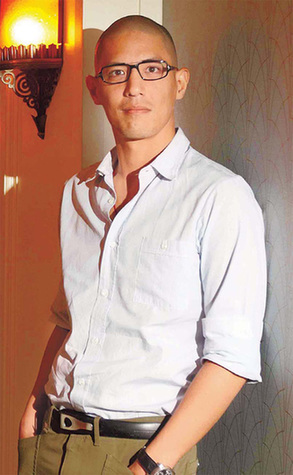hotrecommend
The demos factor
By Qian Yanfeng (China Daily)
Updated: 2010-08-29 07:16
 |
Large Medium Small |
Chiang Kai-shek's great-grandson is out to prove he is his own man and that the Made-in-China brand is a powerful tool. Qian Yanfeng comes face to face with the brave young Turk.
 Demos Chiang combines western management techniques with Chinese asthetics for a winning formula. Gao Erqiang / China Daily |
In Taiwan, his seven-year old design and branding firm, DEM Inc. has already chalked up a list of impressive blue-chip clients headed by major international brands Motorola, Johnny Walker, Microsoft and Renault F1 Team.
Two years ago, Chiang crossed the Taiwan Straits and set up a branch studio in Shanghai and demonstrated once more that he is the new force in the Greater China design industry. His focus is now fixed on the mainland, which he admits provides more than half of his company's business - and growing.
He was retained first by home-grown manufacturer Lenovo, China's largest computer maker. For them, Chiang created a lovable mascot named Coco Bear, distributed free with Lenovo laptops during a marketing campaign. It was a cute gimmick that stimulated impressive spikes in the sales charts.
Chiang also masterminded the branding for newly launched Chinese luxury cosmetic range Shanghai Vive. His design strategy was to appeal to the modern women's love of the nostalgic elegance of Shanghai in the 1930s. The images and inspiration for the campaign came from classic women's magazines from that era which he found at the University of Columbia's library archives.
For Chiang, the Chinese culture is a rich storehouse from which he can draw inspiration for designs that work on the international stage.
He tapped into this resource when he put the legendary Chinese phoenix - the symbol of eternal life - on the Renault F1 Team cars. It caught the attention of the whole world when the team won the championship in 2005.
Then he added a touch of Chinoiserie to the Louis Vuitton shop window at its flagship store in Kaohsiung in southwestern Taiwan, when he positioned a traditional calligraphy brush set next to the display of LV fountain pens.
This is Chiang's way of proving it is his native understanding of the Chinese culture that adds value to his services. It is also vindication for the many times he had felt humiliated or angered by the indiscriminate use of Chinese cultural elements by Western designers who slapped them on products which were then sold back to the Chinese - at a premium.
It is a new form of nationalism for the progeny of a dynasty that has ruled Taiwan for so many decades.
"My clients choose me exactly because I can bring them value and profits," Chiang says with characteristic self-confidence.
He is after all, the scion of a clan that once held sway over millions.
His great-grandfather and grandfather ruled the island for most of four decades and although his own father made him promise not to go into politics, Chiang has blazed a new trail that may make him even more influential than his famous forebears.
And it is obvious he wants this success firmly founded on the Chinese mainland.
Despite a treacherous startup period, DEM Inc. is making serious headway into a competitive market both at home and abroad, a success due largely to Demos Chiang's personal formula of incorporating the best of Western management methods with aesthetic talents inspired by thousands of years of Chinese culture.
A very good indicator of his corporate and personal philosophy is summed up in one question. Ask him what his best work is, and the answer is always: The next one.
He has style, flair, poster-boy looks and an edgy attitude peppered with defiance - as befitting a new man of the new age.
Chiang has been under the spotlight from day one, with the media hungry for the smallest details from his public or personal profiles. A Taiwan survey back in 2006 already identified him as the "best-looking working man" on the island.
But he is not the most eligible. He married actress Lin Heng-yi in 2003 and has since established a reputation as an "ideal husband", calling it a day every day at 2 pm so he can go back home to his wife and two children.
Politically, the public finds it a lot harder to categorize Demos Chiang.
He has consistently declared he is not interested in politics and that he will abide by his father's wishes that he never enters that particular arena, though sometimes it is harder in practice.
In his personal blog started in 2007, he lays out his own manifesto - to demystify many of the stories that surround the Chiang family, to assert his right to be his own man, to shed the baggage of being merely an offspring of a political clan.
Demos Chiang is certainly out to re-invent his family name, and he often declares he is now the first generation, the founder of his own family, not the fourth generation after his great-grandfather.
He starts by relegating the images of his great-grandfather and grandfather to a unique place far removed from reality.
In a series of DEM designs, the once hardened faces of Chiang Kai-shek and Chiang Ching-kuo are turned into cartoon images often clad in superman costumes. Printed on postcards, T-shirts and various souvenirs, the series has proved to be an instant hit.
It is the Demos way of telling the world: Come to terms with the past. Make peace with history.
Xu Junqian contributed to the story.